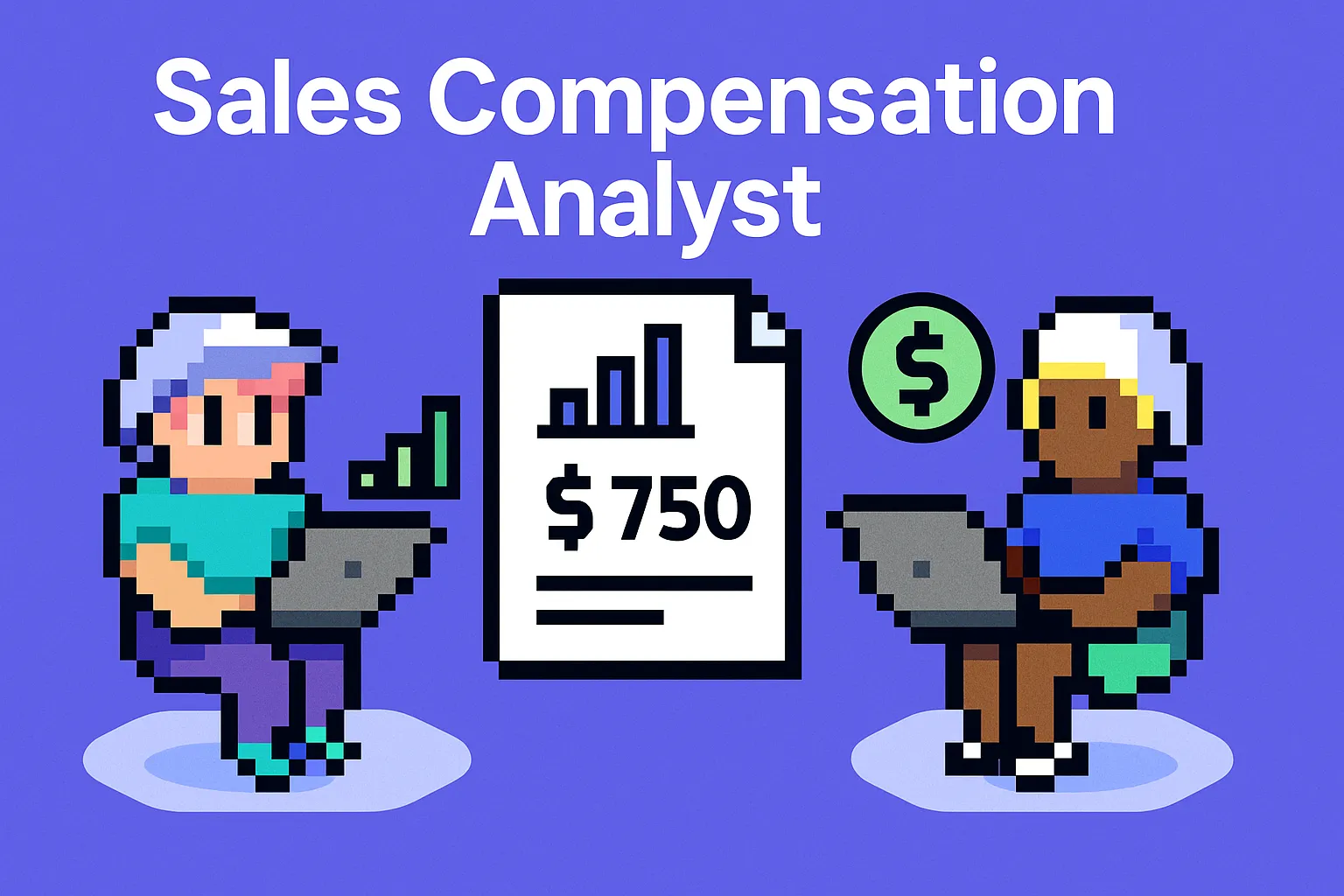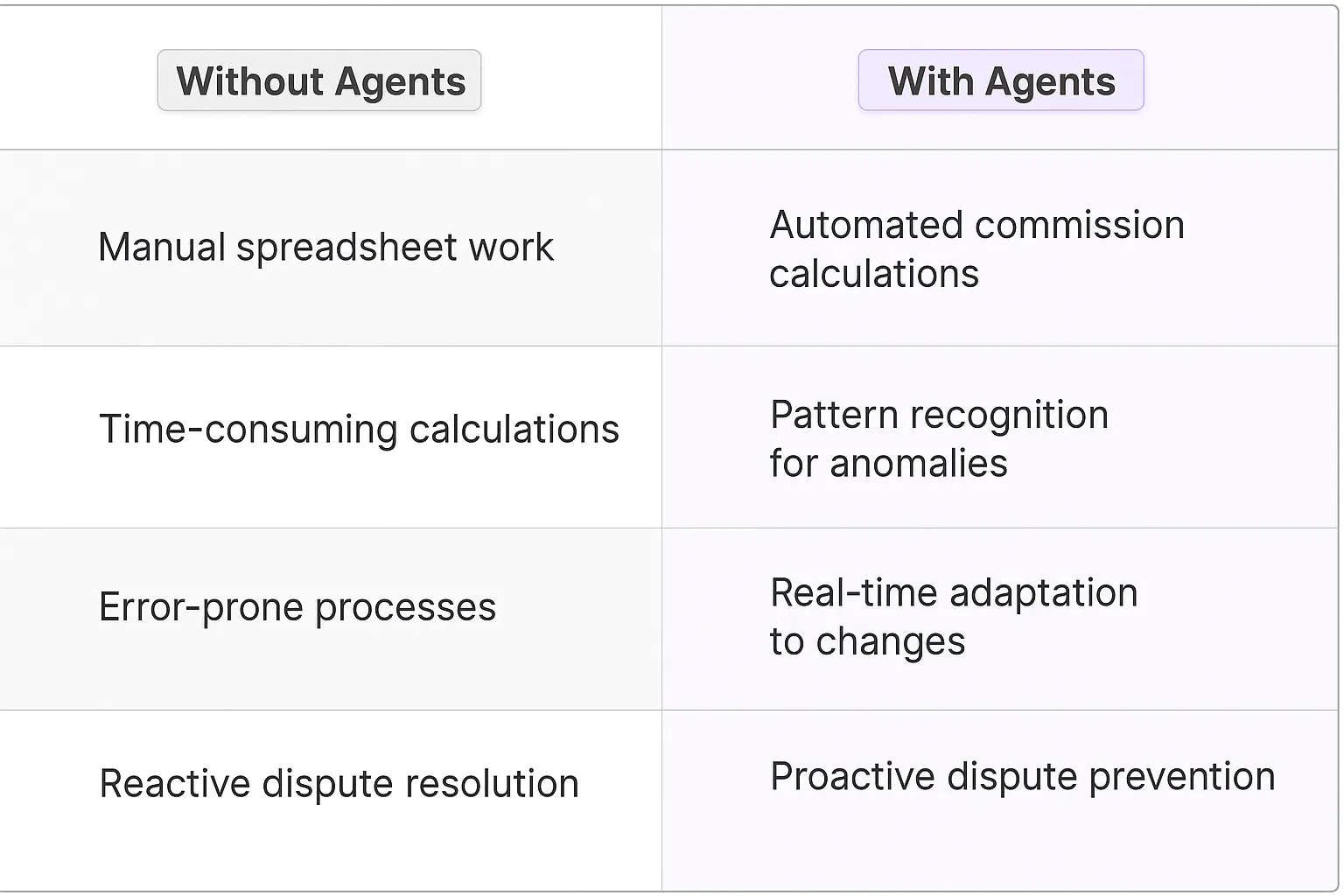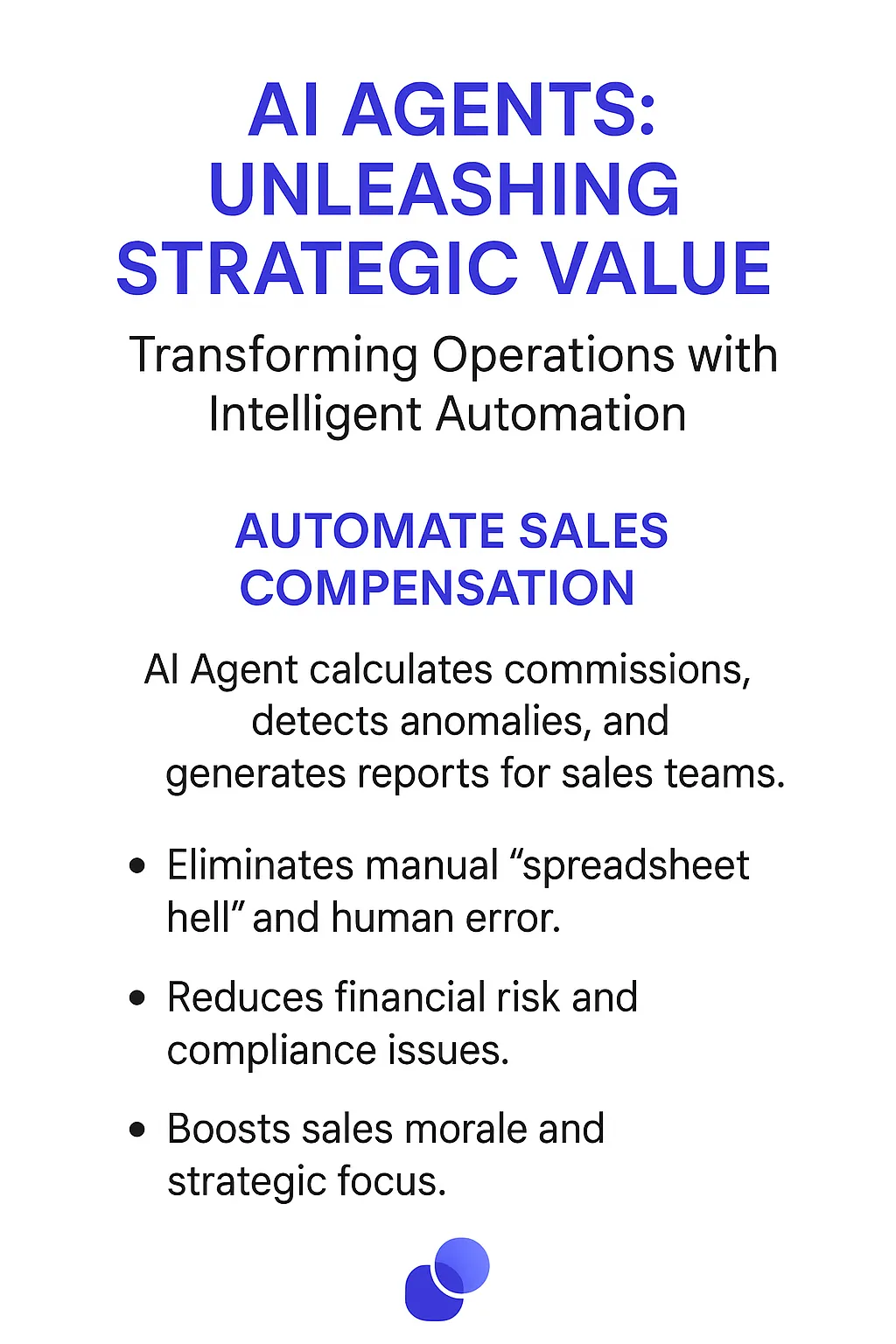A Sales Compensation Analyst AI agent is a sophisticated digital teammate that processes and analyzes sales compensation data using advanced machine learning algorithms. It goes beyond basic automation by understanding complex commission structures, identifying patterns in sales performance, and providing strategic recommendations for compensation plan optimization. These AI agents serve as a force multiplier for compensation teams, handling the computational heavy lifting while enabling analysts to focus on strategic decisions.

Sales comp analysts traditionally lived in spreadsheet hell. They'd spend countless hours manually pulling data from CRM systems, wrestling with complex Excel formulas, and double-checking commission calculations. The process was mind-numbingly tedious - I've seen teams of analysts dedicating entire weeks each quarter just to validate commission structures and handle disputes. They relied on a combination of basic Excel macros, rigid legacy software, and manual data entry that was about as exciting as watching paint dry.
Digital teammates fundamentally transform how sales compensation gets done. The raw computational power means they can process millions of transactions and commission rules in seconds - but that's just the beginning. The real magic happens in three key areas:
The network effects here are fascinating - each organization's compensation data makes the AI smarter at identifying industry benchmarks and best practices. We're seeing sales comp teams reduce their quarterly close process from weeks to days while dramatically improving accuracy. This isn't just automation - it's augmentation that lets analysts focus on strategic work like plan design and sales behavior optimization.

The integration of AI agents into sales compensation analysis transforms what has traditionally been a time-intensive, error-prone process into a precise, data-driven operation. Sales teams gain unprecedented visibility into their earnings potential, while finance teams benefit from automated accuracy checks and standardized calculation methods.
What's particularly powerful is how these digital teammates can process complex compensation rules in seconds - tasks that previously took compensation analysts hours or days to complete. They're especially valuable during high-volume periods like quarter-end or annual compensation reviews.
The real game-changer is the ability to run sophisticated "what-if" scenarios. Sales leaders can model different compensation structures and immediately see the projected impact on sales behavior and company financials. This leads to more strategic decision-making and better-aligned incentive programs.
As these AI agents evolve, we'll see them take on more sophisticated roles in sales compensation strategy. They'll likely develop capabilities to predict sales rep attrition based on compensation satisfaction, suggest personalized motivation strategies, and automatically adjust commission structures based on market conditions.
The next frontier is using these digital teammates to create truly dynamic compensation systems that adapt in real-time to changing business conditions while maintaining perfect accuracy and compliance. This shift from static to dynamic compensation management could fundamentally change how companies approach sales incentives.

The integration of AI agents into sales compensation analysis represents a fundamental shift in how companies handle their incentive structures. Sales compensation analysts across industries are discovering that digital teammates can transform complex compensation calculations from time-consuming manual processes into precise, data-driven operations.
Financial services firms deploy AI agents to parse through intricate commission structures for their wealth management divisions, automatically factoring in tiered bonus systems and cross-selling incentives. Tech companies use these digital teammates to analyze real-time sales performance data, helping compensation analysts spot trends and adjust incentive programs before quarterly reviews.
In pharmaceutical sales, where compensation models often involve multiple products and varying commission rates, AI agents help analysts decode the impact of different incentive structures on sales behavior. Manufacturing companies leverage these tools to align their compensation models with both individual sales performance and broader market conditions, ensuring their incentive programs remain competitive and motivating.
The depth and breadth of these applications show how AI agents are becoming essential partners for compensation analysts who need to process vast amounts of sales data while maintaining accuracy and fairness in their calculations.
The SaaS industry faces a unique challenge with sales compensation - the sheer complexity of multi-tiered pricing models combined with various commission structures creates a perfect storm of computational overhead. I've seen firsthand how Sales Compensation Analyst AI agents transform this landscape, particularly at growth-stage SaaS companies scaling from 50 to 500 sales reps.
A Sales Compensation Analyst AI agent can process historical deal data, commission structures, and quota attainment patterns to identify optimization opportunities that human analysts might miss. For example, when working with a Series B enterprise software company, the AI agent analyzed 18 months of sales data and uncovered that their accelerator thresholds were actually creating a perverse incentive - reps were holding deals until the next quarter to hit higher commission tiers.
The real power comes from the AI agent's ability to simulate different compensation scenarios in real-time. Rather than spending weeks building Excel models, sales leaders can test how adjusting specific commission rates or adding new SPIFs might impact both sales behavior and the bottom line. One mid-market SaaS company used their AI agent to model 15 different compensation structures across their SDR, AE, and customer success teams in just 3 days - a process that would typically take 2-3 months.
Beyond just number crunching, these AI agents excel at identifying patterns in top performer compensation that can inform hiring and territory planning. They can predict which commission structures are most likely to retain high performers while maintaining healthy margins. This level of analysis would typically require a full-time compensation analyst plus input from finance and sales ops teams.
The most successful implementations I've seen pair these AI agents with quarterly compensation reviews, using the AI's insights to make data-driven adjustments to comp plans that align with company growth targets while keeping sales teams motivated and productive.
Manufacturing companies operate in a fascinating space where traditional direct sales teams overlap with distributor networks, creating multi-layered compensation challenges that would make even the most seasoned analyst's head spin. I recently studied how Sales Compensation Analyst AI agents are transforming compensation management at a $500M industrial equipment manufacturer.
The AI agent tackled a problem that had plagued their compensation team for years - balancing incentives between direct sales reps and distributor relationships. By analyzing three years of transaction data across 200+ distributors and 50 direct sales reps, the AI agent identified subtle cannibalization patterns that were creating territory conflicts and reducing overall sales effectiveness.
What's particularly interesting is how the AI agent handled the complexity of tiered pricing across different product lines. Traditional compensation analysts might spend 15-20 hours per week just reconciling special pricing agreements with standard commission rates. The AI agent not only automated this process but uncovered that certain product bundling strategies were actually reducing rep motivation due to commission compression.
One of the most impactful findings came when the AI agent analyzed seasonal sales patterns against compensation structures. It discovered that the standard quarterly quota system was misaligned with the industry's natural buying cycles, leading to feast-or-famine commission payments that hurt rep retention. The manufacturer shifted to a rolling 6-month quota system based on the AI's analysis, resulting in 23% lower rep turnover.
The scaling effects are remarkable - as the AI agent ingests more data, it gets better at predicting which compensation structures will drive desired behaviors across different channels. For example, it identified that increasing base commission rates for new product lines while reducing spiffs on mature products led to better market penetration without increasing overall compensation costs.
This kind of nuanced analysis would typically require a team of 3-4 full-time compensation analysts plus significant input from sales leadership. The AI agent effectively serves as a tireless analyst that can process complex scenarios while accounting for the unique dynamics of manufacturing sales cycles.
Building an effective Sales Compensation Analyst AI agent requires wrestling with complex data integration issues. Most companies store compensation data across multiple systems - CRM platforms, payroll platforms, and commission tracking tools. The AI needs clean, standardized data pipelines to accurately calculate commissions and spot errors. We've seen companies struggle when their data lives in legacy systems that don't play nicely together.
The mathematical models also need careful calibration. Sales comp plans often include intricate rules around accelerators, splits, and clawbacks. Teaching an AI to handle edge cases - like how to properly attribute team deals or calculate partial credit - requires extensive training. The models need regular retraining as comp plans evolve.
Sales reps are (rightfully) sensitive about their commissions. Rolling out an AI system to handle their pay requires thoughtful change management. The digital teammate needs to demonstrate consistent accuracy while providing clear explanations for its calculations. Building trust takes time.
There's also the challenge of maintaining human oversight. While AI can automate much of the analysis, experienced comp administrators still need to review edge cases and approve major decisions. Finding the right balance between automation and human judgment is crucial.
Compensation data contains sensitive personal and financial information. The AI system needs robust security controls and audit trails. Companies must ensure the solution complies with data privacy regulations across regions. Many organizations also require the ability to restrict access to compensation data based on roles and territories.
For global companies, managing different currencies, tax implications, and country-specific compensation rules adds another layer of complexity. The AI needs to handle these variations while maintaining consistency in its core calculations.
Success depends heavily on smooth integration with existing systems. The AI agent needs bi-directional data flows with CRM platforms, HR systems, and financial software. It should plug into existing approval workflows and notification systems. Custom integrations often become a major part of the implementation effort.
Sales Compensation Analyst AI agents represent a fundamental shift in how organizations manage their sales incentive programs. The technology's ability to process complex calculations, identify patterns, and provide strategic insights transforms what was once a purely administrative function into a strategic driver of sales performance. As these digital teammates continue to evolve, they'll enable even more sophisticated approaches to compensation management, helping organizations build more effective, data-driven sales incentive programs. The companies that embrace this technology now will have a significant advantage in attracting and retaining top sales talent while optimizing their compensation spend.